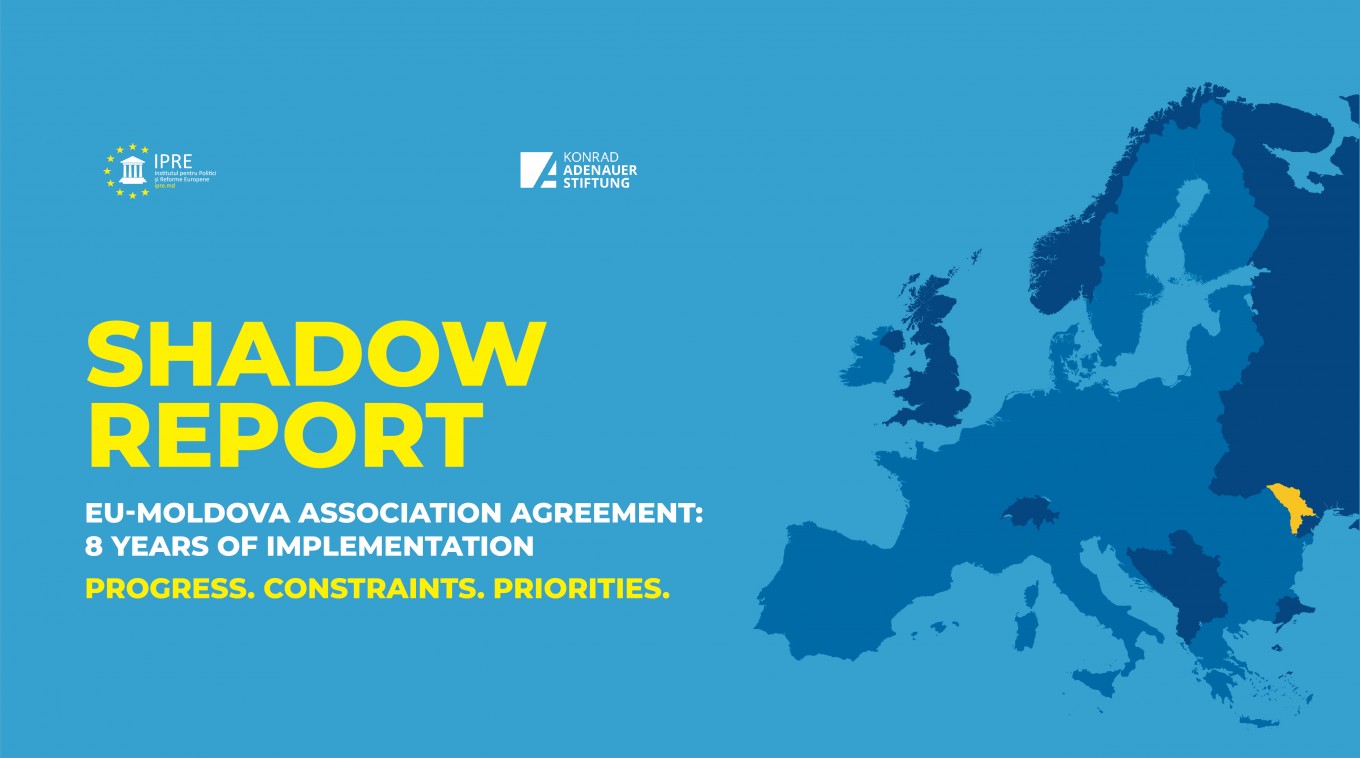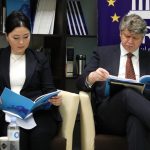IPRE Alternative Report: 8 years of implementation of the EU-Moldova Association Agreement – Progress, Constraints and Priorities

During the eighth year of implementation of the Association Agreement, the EU-Moldova political dialogue was strengthened and advanced, especially on the occasion of receiving the EU candidate status on with on the 23rd June 2022. The EU decision was grounded on the favourable opinion of the European Commission, after evaluating the completed EU Questionnaires in the context Moldova’s EU membership application submitted in March 2022. Moreover, the progress achieved in the implementation of the Association Agreement (AA) was taken into account, together with the commitment of the authorities, firmly anchored on the European and pro-reform path. This assessment was also confirmed by the European Parliament’s Report on the implementation of the AA, adopted on 19 May 2022. Another factor that contributed to the recognition of Moldova’s European perspective was the EU’s determination to send an unequivocal message in response to the Russia’s aggression war against Ukraine.
These are the main findings of the Alternative Report “Eight years of implementation of the EU-Moldova Association Agreement: Progress. Constraints. Priorities”, presented today, November 25, 2022, by the Institute for European Policies and Reforms (IPRE), in partnership with the National Platform of the Eastern Partnership Civil Society Forum and with the support offered by the Konrad Adenauer Foundation of the Republic of Moldova.
According to IPRE analysts, The European Union remains the most important development partner of the Republic of Moldova. From the end of 2021 until August 2022, the EU allocated over EUR 340 million in the form of grants, budget support and projects, to respond to socio-economic, energy, humanitarian and security crises. The EU is also supporting strategic communication, investigative journalism and fight against disinformation through a EUR 5 million project. In 2022, the EU has mobilized ten million EUR to support civil society participation in the implementation of the Association Agreement. Additionally, in July 2022, a new EU Macro-financial Assistance Program in the amount of EUR 150 million came into force, which will contribute to the country’s efforts to deal with the repercussions of the Russian invasion of Ukraine. On 1 August 2022, the EU transferred the first instalment of EUR 50 million, of which 35 million in the form of long-term loans under concessional terms and 15 million in the form of grants. In addition, within the Economic and Investment Plan of the Eastern Partnership, the European Investment Bank (EIB) agreed to grant the Republic of Moldova a loan of EUR 150 million for investments in modern highways and improving road safety and connecting Moldova to the TEN-T network. Moreover, on November 10, 2022, during the official visit to Chisinau, the President of the European Commission announced additional support for the Republic of Moldova of EUR 250 million to tackle with the energy crisis. Thus, 200 EUR million will be offered in the framework of a new macro-financial assistance program that will be available from January 2023 and another 50 million euros in the form of direct budget support.
At the same time, in order to respond to the needs of the Republic of Moldova in the management of numerous crises, Upon the initiative of foreign affairs ministers of Germany, France and Romania, the Support Platform for Moldova was launched in April 2022, to help Moldova in addressing numerous crises. The Platform includes the EU member states, G7 countries, international financial institutions and of international organizations as well as other development partners. During the first two conferences of the Platform, which have been held in Berlin and in Bucharest, approximately EUR 1.3 billion have been mobilized for the next three years.
EU-Moldova cooperation in the field of foreign and security policy was deepened and expanded, following the energy, security and humanitarian crises generated by Russia’s war against Ukraine, but also the advancement of the Republic of Moldova towards obtaining the EU candidate status. The EU-Moldova high-level dialogue on foreign and security policy was launched and the EU-Moldova political consultations in the field of security and defence were resumed. The Republic of Moldova aligns itself with most EU Declarations and EU Council Decisions regarding international restrictive measures. Via the new European Peace Facility, the EU Council approved two programs worth EUR 47 million for the next three years. In this respect, the Republic of Moldova and the EU are going to capitalize on all the cooperation and support mechanisms to increase the level of resilience, but also to provide the country with capacities to monitor, identify, prevent and respond to threats against security and constitutional order. The authorities initiated the development of the National Security Strategy.
In the reference period, the most substantial progress was achieved in the rule of law chapter, upon approval of the Strategy on Ensuring Independence and Integrity of the Justice Sector for the years 2022–2025 and the Action Plan for its implementation. Additionally, during the given period, Law no. 26/2022 on some measures related to the selection of candidates for the position of member in the self-administration bodies of prosecutors and judges, which provides for the organization of a single procedure for evaluating the financial and ethical integrity of the candidates registered in the contest for the position of member in the Superior Council of Prosecutors, in the Superior Council of Magistracy and in the specialized subordinated boards. The pre-vetting in question is under implementation. Also, a series of amendments were approved at the legislative level that transpose the new constitutional provisions, entered into force on 1 April 2022, which aim to increase the independence of the Superior Council of the Magistracy, the elimination of the five-year mandate for beginner judges, but also other measures to ensure enhanced independence of the judiciary. What is more, Law no. 152/2006 on the National Institute of Justice was amended, to ensure an additional system for verifying the integrity of candidates, but also several institutional strengthening measures.
Trade with the European Union was expanded and strengthened during last year. Exports of goods from the Republic of Moldova to EU member states registered an increase of USD 270 million in 2021 compared to 2020 and constituted USD 1.91 billion, which represents about 61.1% of the country’s total exports for the past year. Percentagewise, the share of exports to the EU decreased by 5.4 % compared to 2020. Exports of goods for the first eight months of 2022 amounted to USD 1.75 billion, which means about 59.5% of the total exports of the Republic of Moldova, with USD 629 million and 55.4% more than in the same period of 2021. In 2021, the use of tariff quotas for plums of 100% (15 thousand tons), but also for grapes, of 81 % (16.2 thousand tons out of 20 thousand available) was made possible. For other products, the tariff quotas were used only in a small proportion (cherries – 4%, apples – 3%, grape juice – 17%). In the same period, within the Mechanism for the Fraud Prevention in Trade with the EU, the quotas for processed cereals were significantly exceeded, 15.65 thousand tons, representing 313% of the total of 5000 tons. Quotas for corn, including flour and agglomerates, were utilized at 52% of the total of 250 thousand tons. The failure to use tariff quotas for agri-food products remains an important challenge for trade relations with the EU. Only one of the seven tariff quotas was fully utilized. This indicates lack of capacity and resources among domestic producers to be able to meet the quality and competitiveness standards required by the EU
For more details, please find the Shadow Report in English language here and Romanian language here.
The video recording of the public event for the presenting the Report can be watched here.
The Report was prepared within the IPRE Project “Monitoring the implementation of the Association Agreement between the Republic of Moldova and the European Union”, implemented by with the support of the Konrad Adenauer Foundation (KAS).












